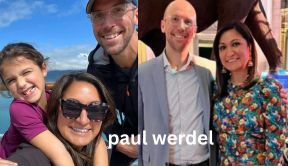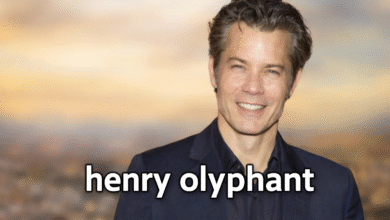Paul Werdel: The Unsung Visionary Behind the Digital Media Shift

Introduction
In the modern era of journalism, where technology and storytelling intersect, many individuals have worked tirelessly behind the scenes to transform how we consume news. One such figure is Paul Werdel, a media innovator whose career reflects adaptability, creativity, and commitment to progress. Though he may not be a household name, Paul Werdel has played a vital role in shaping digital journalism through his contributions to globally recognized media organizations. His work at BBC World News, Al Jazeera English, and The New York Times established him as a pioneer of digital-first journalism. Beyond his professional success, his devotion to family life underscores a legacy built on balance, sacrifice, and dedication.
This article explores the life, career, and influence of Paul Werdel, a quiet yet powerful force in modern media.
Early Life and Academic Foundation
Paul Werdel was born and raised in Baltimore, Maryland. His curiosity about the world and passion for storytelling began during his early years. Interested in current events and the role of journalism in society, he chose to pursue higher education in the field.
In 2002, Paul Werdel graduated with a Bachelor of Arts in Journalism from the University of Maryland. While studying, he actively participated in campus media, including UMTV, the university’s television station. There, he gained firsthand experience in reporting, editing, and production. What set Paul Werdel apart during these formative years was his vision for the future of journalism—he saw technology not as a threat but as a tool to enhance storytelling.
Building a Career on Innovation
The professional journey of Paul Werdel began in 2004 at BBC World News. As a producer and director, he worked on broadcasts targeted toward U.S. audiences. His ability to manage editorial decisions in the fast-paced environment of television news quickly earned him recognition.
Later, Paul Werdel joined Al Jazeera English, where he focused on digital news production. His role was instrumental in presenting global issues in an accessible manner for international viewers. By this stage, digital platforms were rapidly becoming central to media consumption, and Paul Werdel was already adapting to this transformation.
In 2014, he joined The New York Times, marking a turning point in his career. At The Times, Paul Werdel served as Senior Editor of Platforms and later as Product Director. He was responsible for strategies that expanded the publication’s digital reach. His leadership ensured that content delivery matched the needs of a global digital audience while maintaining the journalistic integrity of the organization.
During his tenure, The New York Times improved its digital platforms, strengthened user engagement, and innovated in multimedia storytelling. Paul Werdel became known as a strategist who could bridge the gap between traditional journalism and technological innovation.
A Personal Commitment to Family
While Paul Werdel excelled professionally, his personal life demonstrates an equally remarkable commitment. In 2007, he married journalist Amna Nawaz, who later became the co-anchor of PBS NewsHour. Together, they have two daughters.
In 2018, Paul Werdel made a deeply personal decision to pause his professional trajectory and take on the role of primary caregiver for their children. This choice allowed Amna Nawaz to pursue her demanding role in journalism without compromise. Nawaz has openly expressed gratitude for her husband’s support, often calling his decision the greatest gift she could receive.
This balance between professional ambition and family responsibility highlights Paul Werdel’s values. His sacrifice emphasizes that the success of one partner often depends on the unseen contributions of the other.
Contributions to Digital Journalism
The influence of Paul Werdel on modern journalism goes far beyond the organizations he worked for. His legacy is tied to the digital-first strategies that are now standard across the industry. By championing multimedia storytelling, integrating interactive graphics, and ensuring mobile accessibility, he helped reshape how news is produced and consumed.
At a time when traditional media outlets were struggling to adjust to the digital revolution, Paul Werdel embraced change. His foresight enabled newsrooms to reach broader audiences through emerging platforms such as mobile apps, social media, and live digital updates.
Even after stepping back from professional life, Paul Werdel continues to mentor journalists and media professionals. His insights into technology-driven storytelling remain influential for those entering the field today.
Paul Werdel as a Media Innovator
What distinguishes Paul Werdel from many others is his vision of digital journalism as a democratizing force. He believed technology should make news more accessible, engaging, and transparent. His work at The New York Times reflected this principle, as he encouraged innovation while preserving journalistic credibility.
From optimizing content for mobile audiences to creating immersive storytelling formats, Paul Werdel consistently looked ahead. His leadership in the integration of multimedia elements helped transform how major publications interact with their readers.
Conclusion
The story of Paul Werdel is one of dedication, innovation, and quiet leadership. His career demonstrates how individuals working behind the scenes can leave lasting impacts on entire industries. At BBC World News, Al Jazeera English, and The New York Times, he influenced the digital transformation of journalism, ensuring that news could evolve alongside technological advancements.
Equally inspiring is his personal life, where his commitment to family reflects a selflessness not often highlighted in professional narratives. By stepping back from his own career to support his wife’s success, Paul Werdel redefined what it means to lead—both at work and at home.
Though not always in the public eye, Paul Werdel’s contributions continue to shape the media world. His story is a reminder that innovation is often driven by those who quietly, yet powerfully, redefine what is possible.
FAQs About Paul Werdel
Q1: Who is Paul Werdel?
Paul Werdel is a media professional known for his work in digital journalism. He held key roles at BBC World News, Al Jazeera English, and The New York Times, contributing significantly to the shift toward digital-first news strategies.
Q2: What is Paul Werdel’s educational background?
Paul Werdel earned a Bachelor of Arts in Journalism from the University of Maryland in 2002, where he also gained hands-on media experience at UMTV.
Q3: What role did Paul Werdel play at The New York Times?
At The New York Times, Paul Werdel served as Senior Editor of Platforms and later as Product Director. He oversaw strategies that expanded the organization’s digital presence and improved content delivery for global audiences.
Q4: How is Paul Werdel connected to Amna Nawaz?
Paul Werdel is married to Amna Nawaz, co-anchor of PBS NewsHour. They married in 2007 and have two daughters.
Q5: Why did Paul Werdel step back from his career?
In 2018, Paul Werdel chose to become the primary caregiver for his daughters, allowing his wife to focus on her role at PBS NewsHour. This decision demonstrated his deep commitment to family.
Q6: What is Paul Werdel’s legacy in journalism?
Paul Werdel’s legacy lies in his contributions to digital journalism. He pioneered strategies that integrated multimedia content and mobile optimization, shaping how modern newsrooms operate today.



